Stefan Ellmauthaler
Winning Snake: Design Choices in Multi-Shot ASP
Aug 15, 2024Abstract:Answer set programming is a well-understood and established problem-solving and knowledge representation paradigm. It has become more prominent amongst a wider audience due to its multiple applications in science and industry. The constant development of advanced programming and modeling techniques extends the toolset for developers and users regularly. This paper demonstrates different techniques to reuse logic program parts (multi-shot) by solving the arcade game snake. This game is particularly interesting because a victory can be assured by solving the underlying NP-hard problem of Hamiltonian Cycles. We will demonstrate five hands-on implementations in clingo and compare their performance in an empirical evaluation. In addition, our implementation utilizes clingraph to generate a simple yet informative image representation of the game's progress.
Nemo: First Glimpse of a New Rule Engine
Aug 30, 2023

Abstract:This system demonstration presents Nemo, a new logic programming engine with a focus on reliability and performance. Nemo is built for data-centric analytic computations, modelled in a fully declarative Datalog dialect. Its scalability for these tasks matches or exceeds that of leading Datalog systems. We demonstrate uses in reasoning with knowledge graphs and ontologies with 10^5 to 10^8 input facts, all on a laptop. Nemo is written in Rust and available as a free and open source tool.
* In Proceedings ICLP 2023, arXiv:2308.14898
Reactive Multi-Context Systems: Heterogeneous Reasoning in Dynamic Environments
Dec 11, 2017
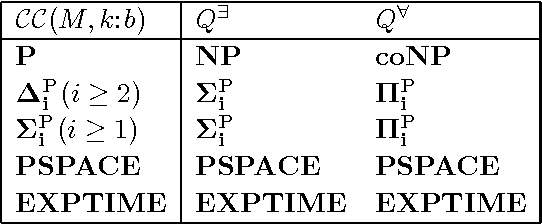

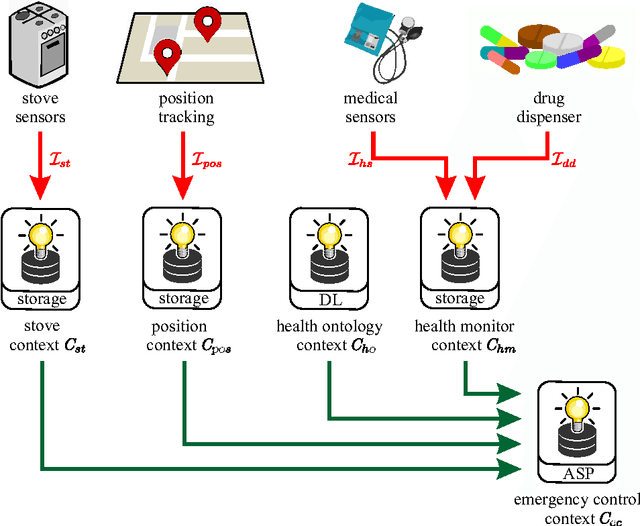
Abstract:Managed multi-context systems (mMCSs) allow for the integration of heterogeneous knowledge sources in a modular and very general way. They were, however, mainly designed for static scenarios and are therefore not well-suited for dynamic environments in which continuous reasoning over such heterogeneous knowledge with constantly arriving streams of data is necessary. In this paper, we introduce reactive multi-context systems (rMCSs), a framework for reactive reasoning in the presence of heterogeneous knowledge sources and data streams. We show that rMCSs are indeed well-suited for this purpose by illustrating how several typical problems arising in the context of stream reasoning can be handled using them, by showing how inconsistencies possibly occurring in the integration of multiple knowledge sources can be handled, and by arguing that the potential non-determinism of rMCSs can be avoided if needed using an alternative, more skeptical well-founded semantics instead with beneficial computational properties. We also investigate the computational complexity of various reasoning problems related to rMCSs. Finally, we discuss related work, and show that rMCSs do not only generalize mMCSs to dynamic settings, but also capture/extend relevant approaches w.r.t. dynamics in knowledge representation and stream reasoning.
Stream Packing for Asynchronous Multi-Context Systems using ASP
Nov 17, 2016
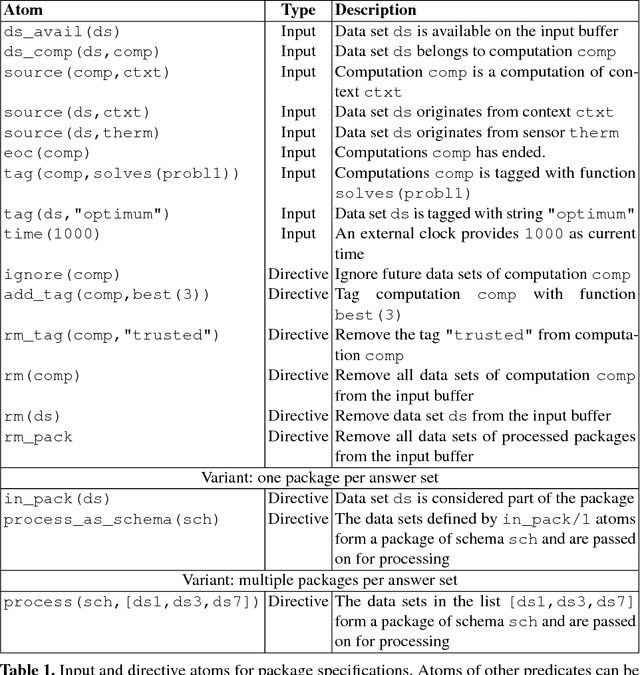
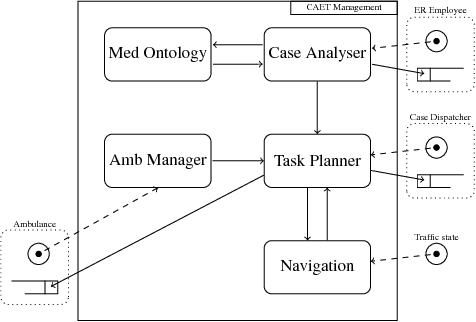
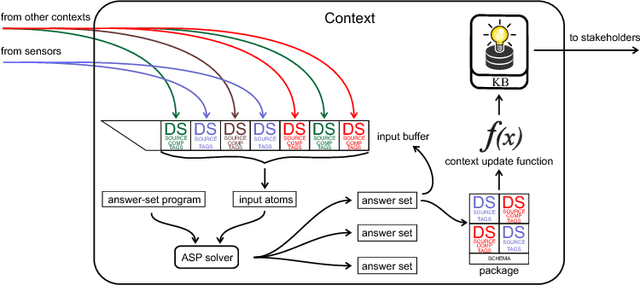
Abstract:When a processing unit relies on data from external streams, we may face the problem that the stream data needs to be rearranged in a way that allows the unit to perform its task(s). On arrival of new data, we must decide whether there is sufficient information available to start processing or whether to wait for more data. Furthermore, we need to ensure that the data meets the input specification of the processing step. In the case of multiple input streams it is also necessary to coordinate which data from which incoming stream should form the input of the next process instantiation. In this work, we propose a declarative approach as an interface between multiple streams and a processing unit. The idea is to specify via answer-set programming how to arrange incoming data in packages that are suitable as input for subsequent processing. Our approach is intended for use in asynchronous multi-context systems (aMCSs), a recently proposed framework for loose coupling of knowledge representation formalisms that allows for online reasoning in a dynamic environment. Contexts in aMCSs process data streams from external sources and other contexts.
Asynchronous Multi-Context Systems
May 20, 2015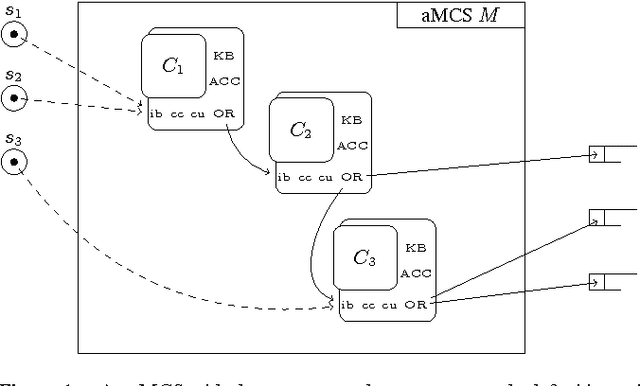
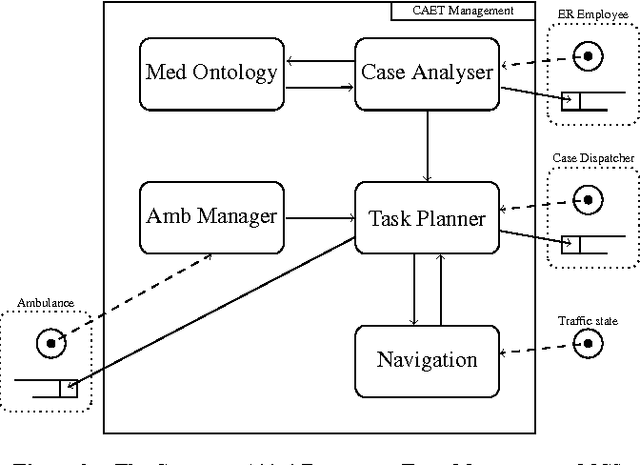
Abstract:In this work, we present asynchronous multi-context systems (aMCSs), which provide a framework for loosely coupling different knowledge representation formalisms that allows for online reasoning in a dynamic environment. Systems of this kind may interact with the outside world via input and output streams and may therefore react to a continuous flow of external information. In contrast to recent proposals, contexts in an aMCS communicate with each other in an asynchronous way which fits the needs of many application domains and is beneficial for scalability. The federal semantics of aMCSs renders our framework an integration approach rather than a knowledge representation formalism itself. We illustrate the introduced concepts by means of an example scenario dealing with rescue services. In addition, we compare aMCSs to reactive multi-context systems and describe how to simulate the latter with our novel approach.
Multi-Context Systems for Reactive Reasoning in Dynamic Environments
May 20, 2015
Abstract:We show in this paper how managed multi-context systems (mMCSs) can be turned into a reactive formalism suitable for continuous reasoning in dynamic environments. We extend mMCSs with (abstract) sensors and define the notion of a run of the extended systems. We then show how typical problems arising in online reasoning can be addressed: handling potentially inconsistent sensor input, modeling intelligent forms of forgetting, selective integration of knowledge, and controlling the reasoning effort spent by contexts, like setting contexts to an idle mode. We also investigate the complexity of some important related decision problems and discuss different design choices which are given to the knowledge engineer.
The DIAMOND System for Argumentation: Preliminary Report
Dec 20, 2013Abstract:Abstract dialectical frameworks (ADFs) are a powerful generalisation of Dung's abstract argumentation frameworks. In this paper we present an answer set programming based software system, called DIAMOND (DIAlectical MOdels eNcoDing). It translates ADFs into answer set programs whose stable models correspond to models of the ADF with respect to several semantics (i.e. admissible, complete, stable, grounded).
 Add to Chrome
Add to Chrome Add to Firefox
Add to Firefox Add to Edge
Add to Edge